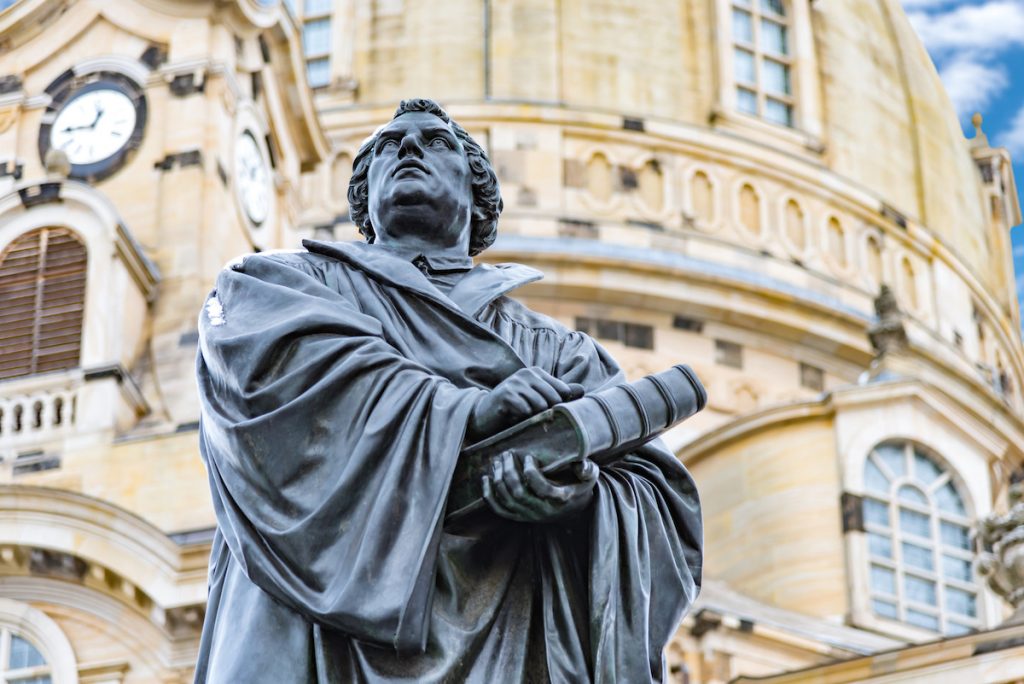The now concluded anniversary year of Martin Luther’s inauguration of the Protestant Reformation afforded many opportunities for both myth-making and myth-busting. So when Joseph Loconte and Eric Metaxas, for example, revived the simplistic nineteenth-century narrative of Luther as proto-liberal, pushback was to be expected—and welcomed. Unfortunately, though, some reactions have perpetuated equally outdated and untenable myths. Representative are recent essays by Robert Reilly and Timothy Gordon in which Luther is portrayed not as “the progenitor of modern freedom,” but of “political absolutism in the modern state—the very antithesis of freedom.”
The broader question of Luther and liberalism is far too complex to address in a short essay, but the specific—and popular—logic of Reilly’s essay does warrant comment and correction. That logic is briefly summarized in the assertion that Luther’s “abandonment of natural law would ultimately clear the path to absolute political authority.” This abandonment of natural law is itself the consequence, Reilly argues, of Luther’s “exaggeration of the effects of original sin,” which “led ineluctably to the denigration of reason and the denial of free will.” Gordon follows Reilly in emphasizing this “ineluctable” logic: Luther “must be said to have rejected natural law on the basis of his Protestant view of sin, will, and intellect” (emphasis mine).
There is, admittedly, something attractive about such a tidy construction, in which history proceeds within the rigorous confines of deductive logic. The problem, of course, is that history is not a deductive discipline in which one can know what the conclusion “must be” in view of certain premises. And even if one were to attempt such an a priori history, if the conclusions stand in contradiction to known facts, one would have to acknowledge that there was something wrong with the initial premises.
The Facts about Luther and Natural Law
Start your day with Public Discourse
Sign up and get our daily essays sent straight to your inbox.Reilly derives his own premises from the now standard catena of quotations in which Luther derides reason as “a prostitute” and “whore of the devil,” and critiques the power of free will by saying man is “a bad tree and cannot produce good fruit.” Thus, Reilly summarizes, “Man can neither know the good nor perform the good.” These, then, are the “anti-rational roots” that lead to the “destructive consequences” of Luther’s rejection of natural law.
Despite the parsimonious elegance of such a construction, it is greatly complicated by a number of facts. These are facts Reilly’s readers will perhaps not know, however, because it is precisely when he turns to Luther’s “destructive consequences” that he ceases to quote Luther himself. Though lamentable, this is perfectly understandable for the simple reason that, contrary to Reilly’s assertion of Luther’s “abandonment” and even “obliteration” of it, Luther and his theological heirs remained both consistent and adamant in their profession and defense of natural law.
Acknowledging the biblical witness to such a law, Luther would insist, for example, “Not an individual is there who does not realize, and who is not forced to confess, the justice and truth of the natural law.” In perfect agreement with Thomas Aquinas, who saw the natural law summarized in the Decalogue, Luther too could write that “Moses agrees exactly with nature,” and that “the natural laws were never so orderly and well written as by Moses.” Nevertheless, he continued to insist that, “even if God had never given the Law by Moses, the human mind nevertheless has this knowledge naturally.” Indeed, and perhaps somewhat surprisingly in view of the presumed Protestant “logic” of sola scriptura, Luther would even say of Moses, “Where he gives the commandments, we are not to follow him except so far as he agrees with the natural law.”
Nor can such appeals be dismissed as presumably referring to an aberrant natural law predicated on what Reilly calls Luther’s “voluntarist theology,” in which reason “can know nothing of God,” or what Gordon similarly calls the “bald anti-realism of the so-called Reformation, which denied the knowability of existence.” Again, however “logical” such a conclusion might seem in light of adopted premises, it is a conclusion Luther explicitly rejects. Instead, he repeatedly asserts, for example, that “All men have the general knowledge, namely, that God is, that He has created heaven and earth, that He is just, that He punishes the wicked, etc.” Thus, he can write elsewhere:
It follows from this that natural reason must concede that all that is good comes from God; for He who can save from every need and misfortune is also able to grant all that is good and that makes for happiness. That is as far as the natural light of reason sheds its rays—it regards God as kind, gracious, merciful, and benevolent. And that is indeed a bright light.
The repeatedly confessed ability of “natural reason” to know something of God and his attributes bears directly on the question of the kind of theology that lies behind the natural law philosophy of Luther and Lutheranism. It is indeed the case that the “bald anti-realism” and “voluntarist theology” of late medieval thinkers such as William of Ockham forced Ockham and his disciples to rethink the possibility of traditional natural theology. For similar reasons, they also reformulated the traditional conception of natural law, grounding it now in the divine will. And since God is radically free, Ockham suggested, he could have willed and promulgated a moral law other than that which he has in fact ordained.
By way of contrast, the “realist” or “intellectualist” account, such as we find in Aquinas, understood natural law to be a “participation in the eternal law by rational creatures.” This eternal law—as the very name suggests—was itself understood to originate not with an arbitrary act of the divine will, but to exist in and proceed from God’s immutable nature and intellect. This traditional account was precisely the view of the early Lutheran theologians, as articulated most often by Luther’s colleague and frequent mouthpiece Philip Melanchthon. Natural law, he taught, was congruent with “the eternal and immutable rule of the divine mind” and so is “the eternal and immutable wisdom and justice of God,” who desires men’s actions to “conform to the standard of his own mind.”
Contrary to the tidy narrative offered by Reilly—and before him by authors such as Roscoe Pound, Heinrich Rommen, Alasdair MacIntyre, and Brad Gregory—neither Luther nor his colleagues and heirs “abandoned” natural law. Nor did they recast it in a voluntarist mold. They embraced and defended it along entirely traditional lines.
Luther’s Colorful Descriptions
What is one to make, then, of the supposition that Luther “must be said to have rejected natural law on the basis of his Protestant view of sin, will, and intellect”? Again, if he did not in fact reject natural law, there must be something wrong with the premises concerning his “Protestant view of sin, will, and intellect.” And there is, despite the quotations offered in their support. Even though they are provided without context (or links to actual sources), the very words themselves might raise questions.
One might wonder, for example, why Luther chooses to describe reason with terms like “whore” and “prostitute.” Might it be because prostitution involves the improper use of that which is good in itself and in its proper sphere? That would certainly make better sense of other remarks of Luther’s concerning reason—e.g., “the head of all things . . . the very best, yes, it is divine”—than the simple caricature of him as “anti-rational.” It would also highlight yet again how very much he can sound like Aquinas, who similarly (if less colloquially) criticized the “presumption” of reason when it trespassed beyond its proper boundaries in theological matters.
One might also note that, in speaking of man as “a bad tree” that “cannot produce good fruit,” Luther is simply echoing the language of Scripture—as it speaks of unregenerate men. Such an acknowledgment would then allow one to make sense of his equally emphatic confession that, among the regenerate, “faith is bound to bring forth good fruits and that it is necessary to do the good works commanded by God.”
Even among the unregenerate, though, and in the realm of politics with which Reilly is most concerned, a recognition of the Lutheran endorsement of natural law would preclude Reilly’s rhetorical question, “If reason is not a legislator, why have legislatures?” In point of fact, for Luther and his co-religionists, reason is a legislator—indeed, the legislator. It is “the heart and the empress of the laws, the fountain whence all laws come.” He declares that “God made secular government subordinate and subject to reason” and that “In temporal matters man . . . needs no other light than reason.” Thus, while it is true that Luther occasionally “inveighed against Aristotle”—when he understood Aristotle to be misused as a theological arbiter—even the doctrinal confessions of the Lutheran churches unabashedly conceded that “Aristotle wrote so eruditely about social ethics that nothing further needs to be added.”
None of this is in any way meant to endorse the Metaxas myth that “religious liberty, self-government, and liberty all entered history through the door that Luther opened.” But if one is going to counter such mythmaking, and even go so far as to posit Luther as the father of political absolutism, one will have to do so on grounds other than the demonstrably false assumption that Luther and his fellow Protestants rejected the natural law.













